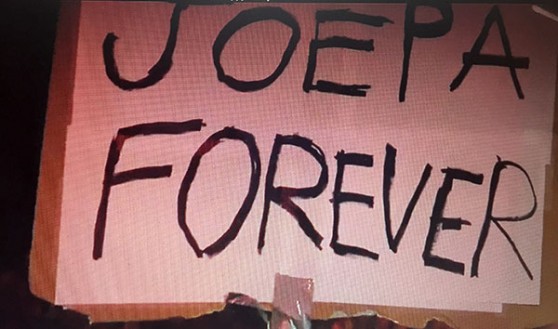19/31: Happy Valley

Screen: Music Box Films
“We all want to think that we live in a better world than we do.”
This comment from a Penn State professor comes at the end of Happy Valley, Amir Bar-Lev’s documentary about the emotional and cultural brush fire that seemed to engulf State College, PA three years ago when the crimes committed against children by Jerry Sandusky — and beloved Penn State football coach Joe Paterno’s alleged failure to act sufficiently forcefully on the knowledge he had of these crimes.
It’s a good line, and the film has a number of moments like that: good “gets” that, in the end, just kind of sit there, not clarifying or adding to our understanding of what happened, and why. There’s a guy standing next to the statues of “Joe Pa” with a handwritten sign calling Paterno a “pedophile enabler,” getting into verbal (and semi-physical, occasionally) dust-ups with tourists and alums who’ve come to visit their hero, and he gets a couple good lines off, like “You don’t like free speech; g’bye. Go to Russia, they don’t like it either.” Matt Sandusky, Jerry’s adopted son and one of his myriad victims, explains that getting taken in by that family meant he’d have a family, meant “going somewhere you’d have food, first of all.” Joe Posnanski, author of Paterno and all-around insightful guy, is no less articulate and skilled at texturizing than he usually is. I just don’t know what any of it’s for. To explore the reaction of the Penn State community to the attack on not just its beloved football program, but its ethics and morals? To assess whether the rest of the world indicted Nittany loyalists as co-conspirators, or whether it should have? To bemoan the power of sport to warp a society’s values?
Happy Valley may have set out to do all those things, or Bar-Lev may just have wanted to “talk it through,” on film, for himself. Whatever the case, the documentary revisits the Sandusky affair without finding much new; it’s the first to feature Matt Sandusky’s participation, stalled until the eleventh hour thanks to legal proceedings, is a new perspective, but while he’s an enormously sympathetic and smart narrator, he only points up Happy Valley‘s inability to pick an angle and stick with it — because you’ve got a bunch. You’ve got the late Paterno’s family, feeling hard done by all around, and not without reason, but not necessarily helping their patriarch’s memory by exasping that he “did what he was legally required to do.” You’ve got Matt Sandusky. You’ve got that student super-fan who rightly notes (if for the wrong reasons) that a pep rally converted to a prayer vigil for Sandusky’s victims feels “fake.” You’ve got Posnanski, stuck between a rock and a hardcover. Any one of these would have made a fascinating deep cut; as it is, Happy Valley feels more like Bar-Lev just didn’t want us to forget that this happened.
That’s okay. He’s right. We shouldn’t forget that this happened; that’s one of the reasons it happened and could happen again, the nauseated horror we feel, the discomfort caused just by the sight of Sandusky’s nervous squinty stupid grin, the simple primal urge to look away and think about something else. Happy Valley is a pretty good sit, not boring, but “don’t turn away from this” isn’t a story; it’s an order, and it’s a bit too tall for Bar-Lev.
Tags: 31 Days 31 Films Amir Bar-Lev documentaries Jerry Sandusky Joe Paterno Joe Posnanski Matt Sandusky movies





Do the PSU fans come off as deranged cultists in the film? That’s what the NCAA painted them as in the wake of the scandal. It seemed a little harsh at the time, but their reaction to the NCAA walking back the sanctions hasn’t exactly covered them in glory.
“Deranged cultists” is a little strong; “benighted monomaniacs,” maybe? …I guess that’s not really any better. Certainly the film is not a fan of their stubborn loyalty.
The problem with any non-negative treatment of Paterno and PSU football is that, to be taken seriously, anyone who suggests that there wasn’t a coverup of child rape needs to spend the next half-hour explaining how they aren’t a child molester, how they don’t approve of child molestation, how they aren’t victim-blaming or denying what happened, etcetera.
So any documentary about it is either going to be one-sided, spend a lot of time on disclaimers and explanations, or just rehash old ground without bringing in anything new.
See, I liked Happy Valley a lot precisely because it didn’t have a strong POV. I appreciated that it included the perspectives of a bunch of different people/groups touched by the Sandusky scandal without taking one particular side or trying to push an agenda or claim that there was, in fact, a clear answer about what Paterno knew and whether or not he did his (moral, ethical) duty. I recommended the movie to my dad, a 1969 PSU alum and huge football fan who was really hurt and disappointed by the Sandusky affair (obviously), mostly because I know he wouldn’t sit through anything that tried to lionize OR demonize Paterno. The guy was a human being, and flawed, and made some bad decisions. Keeping that in mind is helpful as we consider the wisdom of painting halos over his head in murals and/or tearing down all reminders of his existence and legacy at Penn State.
It’s a complicated situation. It’s sad. There is a lot to sift through. There are a lot of opinions, and some of them are less right than others. I thought the film did a good job covering a lot of those perspectives and perhaps making us consider in a more nuanced way the ramifications of how the (terrible) handling of the Sandusky scandal affected different actors at Penn State and beyond. So. Anyway. I liked it.